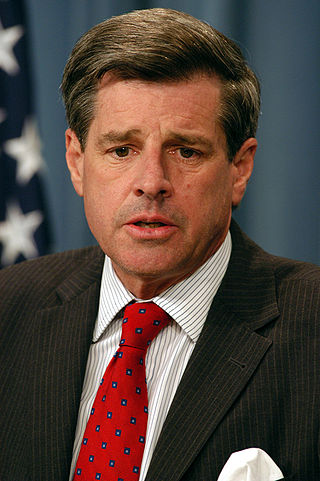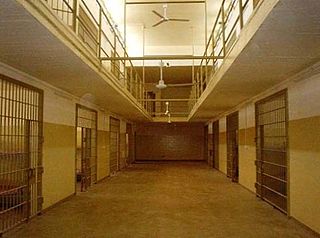This article has multiple issues. Please help improve it or discuss these issues on the talk page . (Learn how and when to remove these messages)
|
This article has multiple issues. Please help improve it or discuss these issues on the talk page . (Learn how and when to remove these messages)
|
In July 2008, the United States Department of Justice investigated around 900 cases of alleged fraud committed by contractors. [1] Similarly, the Defense Contract Audit Agency uncovered $10 billion in questionable Iraq contracts, [1] and a US audit found that the occupation authority had lost track of reconstruction funds totalling nearly $9 billion. [2]
Henry Waxman, then Chairman of the United States House of Representatives Committee on Oversight and Government Reform, said, "The money that's gone into waste, fraud and abuse under these contracts is just so outrageous, it's egregious. It may well turn out to be the largest war profiteering in history." [3]
$12 billion in U.S. currency was transported from the Federal Reserve to Baghdad in April 2003 and June 2004, where it was dispensed by the Coalition Provisional Authority. A Vanity Fair magazine report concluded that of this sum, "at least $9 billion has gone missing". [4]
Dispatches: Iraq's Missing Billions, produced by Guardian Films (March 20, 2006). [5]
A blog on Huffington Post alleged that there "immunized foreign contractors" were involved. [6] US courts issued gag orders that prevent the prosecution or defense from discussing the allegations. The orders apply to 70 court cases against some top US contractors. [7]
At the start of the Iraq war, the United Nations awarded $23 billion of Iraqi money to the US-led coalition to re-develop Iraq. [5]

The Oil-for-Food Programme (OIP) was established by the United Nations in 1995 to allow Iraq to sell oil on the world market in exchange for food, medicine, and other humanitarian needs for ordinary Iraqi citizens without allowing Iraq to boost its military capabilities.

The Coalition Provisional Authority was a transitional government of Iraq established following the invasion of the country on 19 March 2003 by U.S.-led Coalition forces. The invasion marked the fall of Ba'athist regime led by Saddam Hussein.

Lewis Paul Bremer III is a retired American diplomat. He was the second de facto head of state of Iraq as leader of the Coalition Provisional Authority (CPA) following the 2003 invasion of Iraq by the United States, from May 2003 until June 2004.

The occupation of Iraq (2003–2011) began on 20 March 2003, when the United States invaded with a military coalition to overthrow Iraqi president Saddam Hussein and his Arab Socialist Ba'ath Party, and continued until 18 December 2011, when the final batch of American troops left the country. While the United States, the United Kingdom, and Australia were the largest contributors to the coalition, 29 other countries, such as Japan, were involved in the Iraq War in a lesser capacity. Additionally, several private military contractors took part in enforcing the occupation.

KBR, Inc. is a U.S. based company operating in fields of science, technology and engineering.
Academi, formerly known as Blackwater and Blackwater Worldwide, is an American private military contractor founded on December 26, 1997, by former Navy SEAL officer Erik Prince. It was renamed Xe Services in 2009, and was again renamed to Academi in 2011, after it was acquired by a group of private investors. In 2014, Academi merged with Triple Canopy to form Constellis Holdings.

Investment in post-2003 Iraq refers to international efforts to rebuild the infrastructure of Iraq since the Iraq War in 2003. Along with the economic reform of Iraq, international projects have been implemented to repair and upgrade Iraqi water and sewage treatment plants, electricity production, hospitals, schools, housing, and transportation systems. Much of the work has been funded by the Iraq Relief and Reconstruction Fund, and the Coalition Provisional Authority.

Abu Ghraib prison was a prison complex in Abu Ghraib, Iraq, located 32 kilometers (20 mi) west of Baghdad. Abu Ghraib prison was opened in the 1950s and served as a maximum-security prison. From the 1970s, the prison was used by Saddam Hussein to hold political prisoners and later the United States to hold Iraqi prisoners. It developed a reputation for torture and extrajudicial killing, and was closed in 2014.
Hazim al-Shaalan al-Khuzaei was Iraq's Defence Minister from June 2004 until May 2005 under the Iraqi Interim Government of Ayad Allawi.
In May 2003, following the invasion of Iraq in March of that year, the Central Bank of Iraq-Development Fund for Iraq (DFI) account was created at the U.S. Federal Reserve Bank of New York at the request of the Coalition Provisional Authority (CPA) Administrator. A part of the fund has been transferred to Baghdad and Iraq, and the DFI-Baghdad account was opened at the Central Bank of Iraq "for cash payment requirements". The fund also eventually received money from seized and "vested" Iraqi bank accounts and funds seized by coalition forces. $650 million of this amount belongs to Uday Saddam Hussein, the older son of the former Iraqi president. The DFI have been disbursed mainly for "the wheat purchase program, the currency exchange program, the electricity and oil infrastructure programs, equipment for Iraqis security forces, and for Iraqi civil service salaries and ministry budget operations".
Custer Battles, LLC was a defense contractor headquartered in Middletown, Rhode Island, with offices in McLean, Virginia. The company now appears to be out of business. At one time the company offered services that include security services, litigation support, global risk consulting, training and business intelligence, but had no background or track record in offering any of these services.

The U.S. rationale for the Iraq War has faced heavy criticism from an array of popular and official sources both inside and outside the United States. Putting this controversy aside, both proponents and opponents of the invasion have also criticized the prosecution of the war effort along a number of lines. Most significantly, critics have assailed the U.S. and its allies for not devoting enough troops to the mission, not adequately planning for post-invasion Iraq, and for permitting and perpetrating widespread human rights abuses. As the war has progressed, critics have also railed against the high human and financial costs.

Stuart W. Bowen Jr., is an American lawyer who served as the Special Inspector General for Iraq Reconstruction (SIGIR) from October 2004 to October 2013. He previously served as the Inspector General for the Coalition Provisional Authority (CPA-IG), a position to which he was appointed in January 2004.

Philip Bloom is an American businessman who pleaded guilty on April 18, 2006 to conspiracy, bribery and money laundering in connection with a scheme to defraud the Coalition Provisional Authority – South Central Region (CPA-SC) during the occupation of Iraq. According to the Sydney Morning Herald Bloom used CPA funds to pay out over $2 million USD in bribes, in cash, real estate, designer cars, watches, and the services of prostitutes he brought to Bagdad. Bloom accepted at least $1 million in bribes and stole a further $600,000 in cash and goods from CPA funds.

The Embassy of the United States of America in Baghdad is the diplomatic mission of the United States of America in the Republic of Iraq. Ambassador Alina Romanowski is currently the chief of mission.

The Iraq War, also referred to as the Second Gulf War, was a prolonged conflict in Iraq lasting from 2003 to 2011. It began with the invasion by a United States-led coalition, which resulted in the overthrow of the Ba'athist government of Saddam Hussein. The conflict persisted as an insurgency arose against coalition forces and the newly established Iraqi government. US forces were officially withdrawn in 2011. In 2014, the US became re-engaged in Iraq, leading a new coalition under Combined Joint Task Force – Operation Inherent Resolve, as the conflict evolved into the ongoing insurgency.
The Oil-for-Food Program Hearings were held by the U.S Senate Permanent Subcommittee on Investigations beginning in 2004 to investigate abuses of the United Nations (UN) Oil-for-Food Programme in which the economically sanctioned country of Iraq was intended to be able to sell limited amounts of oil in exchange for vital food and medicine for its population.
Jane Phillipa Corbin, Lady Maples is a British journalist and film-maker who has made over a hundred documentaries mainly for the BBC and its current affairs programme Panorama. She specialises in covering Central Asia, the Middle East and terrorism and has investigated many of the major human rights issues and global political and military events over the past three decades.

Corruption is pervasive at all levels of government in Iraq. In 2021, President Barham Salih stated that US$150 billion of oil money had been stolen and smuggled out of Iraq in corrupt deals since the 2003 U.S. invasion. Endemic corruption pervades Iraq's oil and gas sectors, which still accounts for more than 99 percent of the country’s exports and 85 percent of the government’s budget. The Iraqi economy is predominantly a cash economy, making it almost impossible to trace the amount or the path the money follows.

Triple Canopy, Inc., is an American private security company and private military company (PMC) that provides armed security, mission support, and risk management services to corporate and government clients. The firm was founded in May 2003 by United States Army Special Forces veterans, including former Delta Force operators. In June 2014, the firm merged with rival security contracting firm Academi, formerly Blackwater, to form Constellis Group, with Craig Nixon, the former CEO of Academi, becoming the CEO of Constellis Group, and training facilities being consolidated at the existing Academi training facility in North Carolina. It was staffed by, among others, a number of former Army Special Operations personnel, Green Berets, Rangers, SEALs, MARSOC Raiders, other special operations personnel, and several law enforcement officers. At the time of the merger, over 5,000 employees were working for Triple Canopy.
{{cite web}}: |author= has generic name (help)